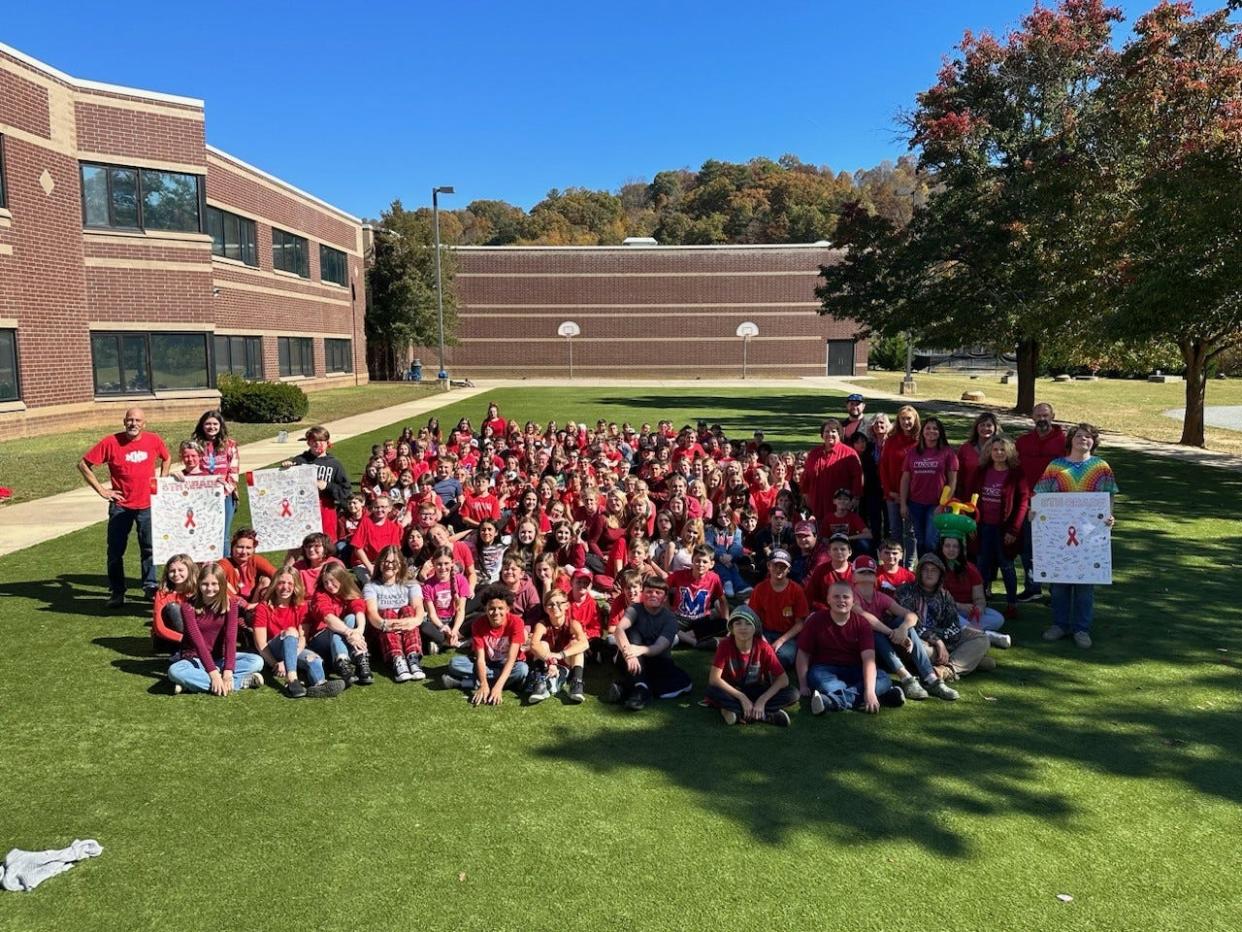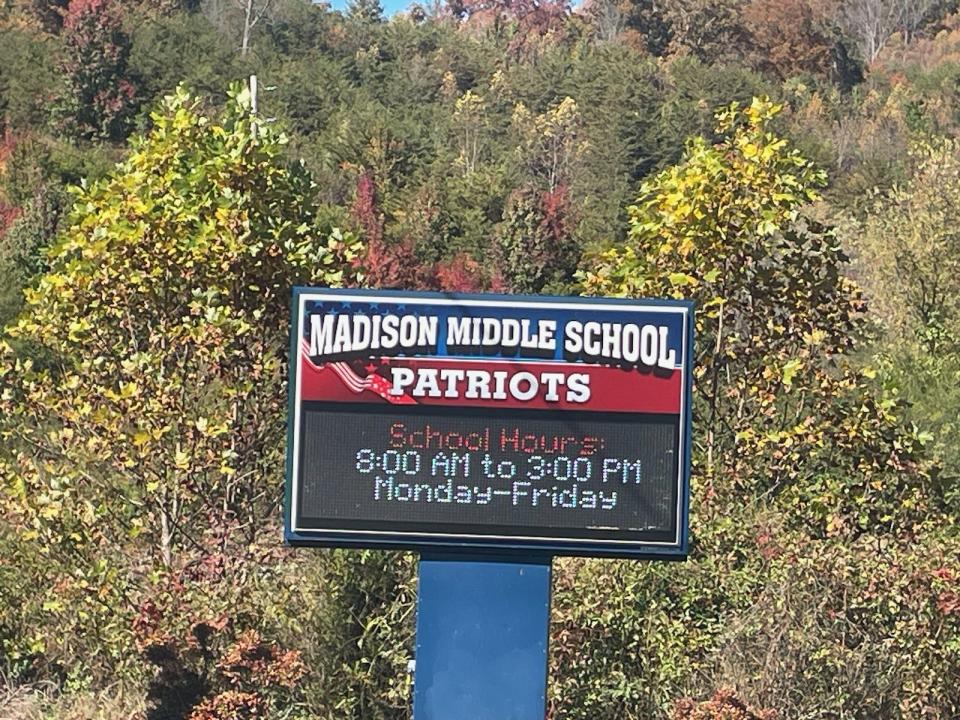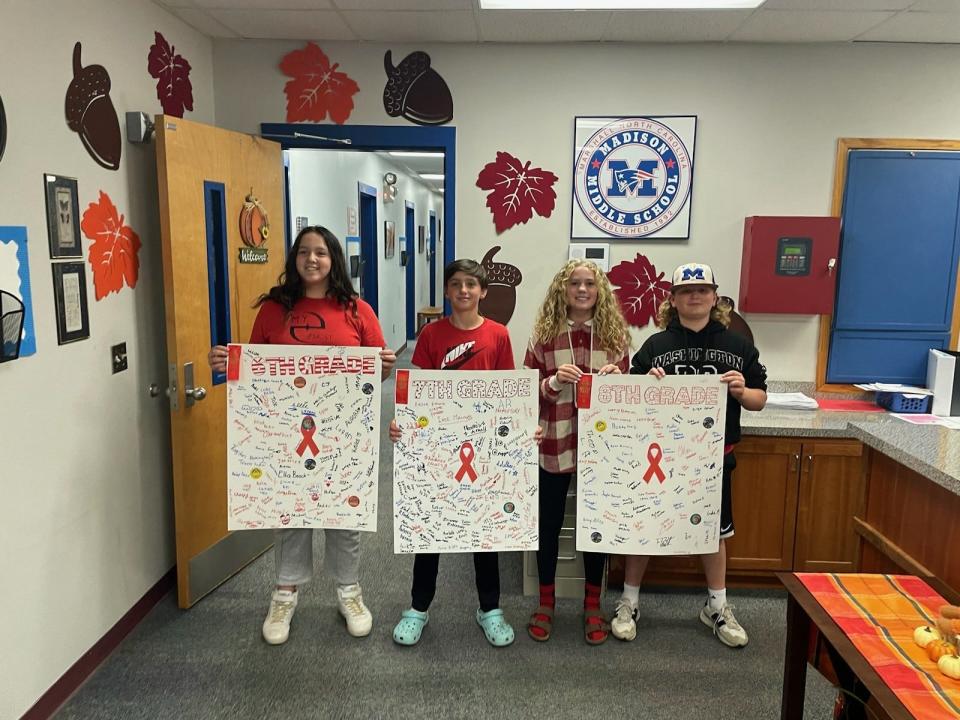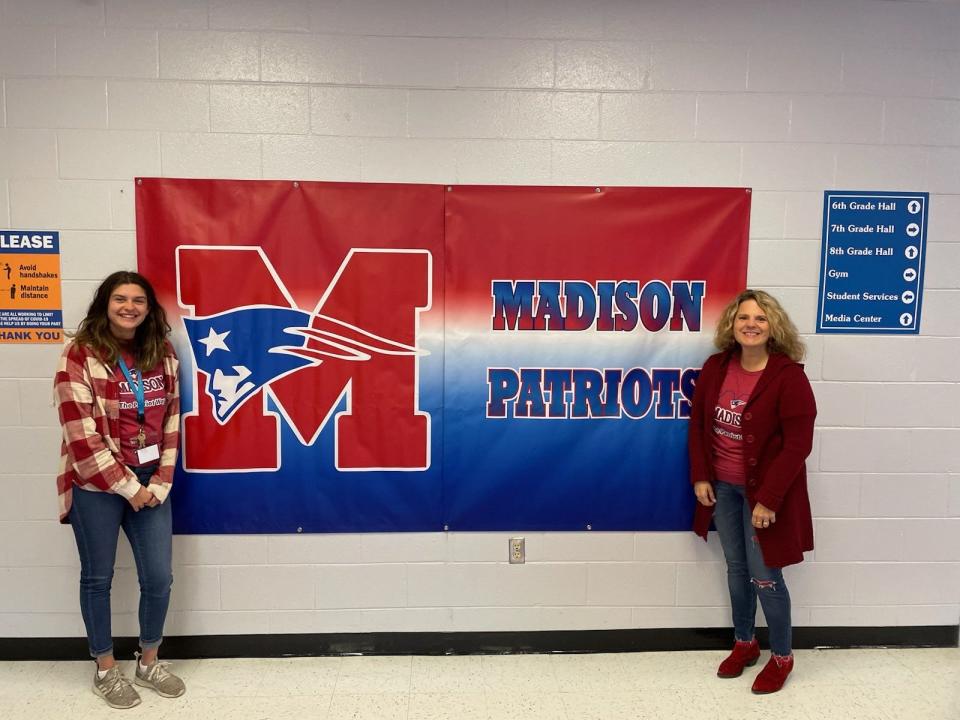Madison Middle School students helping peers say no to drugs during Red Ribbon Week

MARSHALL - Madison Middle School students are doing their part to help prevent substance use among their peers.
On Oct. 23-31, the middle school students participated in Red Ribbon Week, a National Family Partnership campaign founded by a handful of concerned and determined parents who were convinced they should begin to play a leadership role in drug prevention, according to the Red Ribbon Week website.
This year marked the 13th year in which the Red Ribbon Week campaign has organized a photo contest. On Oct. 25, Madison Middle School students gathered outside the front of the school for its biggest picture yet.
Heather Sharp is director of Madison Substance Awareness Coalition and Drug-Free Communities. Madison Substance Awareness Coalition was formed in the 2014 under the North Carolina Coalition Initiative grant to focus on the substance issues facing Madison County, and is composed of members from numerous organizations throughout the county, including the sheriff's office and health department.
Sharp said the 2023 picture featured the largest student turnout yet.
"We typically have a really good turnout. But that was a whole sea of red people," Sharp said.
According to Sharp, the Madison Middle School students' work to help prevent drug use in their communities involves much more than gathering for a picture.

Madison Middle School has been participating in the Red Ribbon Week campaign since 2017, when the Drug-Free Communities grant collocated Madison Substance Awareness Coalition to the middle school.
The News-Record met Oct. 25 with Madison Middle School students Abel, Calvin, Letty and Meredith. The students are members of Madison Patriots Prevention Partnership, or MP3, the teen coalition component of Madison Substance Awareness Coalition.
For Meredith, getting involved with substance use prevention is an issue that hits close to home.
"In my family, we had drug addiction, and I see the causes of that, and the effects that it has on families," Meredith said. "I want to be able to prevent that throughout other families, or just kids who might be offered that."
Calvin, a Madison Middle School eighth grade student, has been involved with Madison Patriots Prevention Partners for three years.
"I don't want to go down the path of doing drugs," he said. "I also want to help prevent people from doing stuff like that."
According to the students, the picture speaks to the impact the organization is having on people throughout the school.
"It's affecting people," Meredith said.
"More people than ever were wearing red today," Abel said.
Madison Patriots Prevention Partners meets biweekly during lunch.
According to Sharp, the number of students involved with MP3 nearly doubled this year, up from 40 to 75.
"Every other Monday we meet during lunch, so these kids are giving up their lunch period," Sharp said. "They grab their lunch, we got to the health room, we have these huge classes. They did all the posters in promoting Red Ribbon Week, that are throughout the halls."

The Red Ribbon Week campaign has been a team effort though, according to Sharp, as Madison Middle Principal Jessica Chandler has promoted the campaign on the school's social media sites, and administration has put out all-call text messages to students and staff reminding them to dress for the occasion to raise awareness during the campaign.
"We're also having students sign pledges, and every student that signs gets a red bracelet," Sharp said. "Staff has bags of treats that we're giving out to students wearing the bracelets."
According to Sharp, in the spring, Madison Patriots Prevention Partnership will coordinate a food drive with the county library system to supplement the Madison County Sheriff's Office backpack drive.
Vaping initiative
Sharp said the middle school students also work with the local high school students from Kathy Mackey's Health Occupations Students of America program.
"They oftentimes do things around mental health and substance use and heart health. We're really infusing mental health awareness into what we're doing, not only in health class, but in MP3, because they need to have skills on coping," Sharp said. "A lot of times, it's the mental health that drives the substance use for coping."
Madison Middle Assistant Principal Eric Blackman said the focus on mental health is especially important post-COVID.
Coming out of COVID, Sharp and Blackman said the administration has seen a drastic reduction in vaping referrals, as one of the team's largest campaigns is to keep kids vape-free.
"It's a combination of the increased enforcement, from the buses on down, and everyone's on board," Sharp said. "You know, it's getting harder for kids to get away with it."
If a student is caught vaping, the recourse for the administration is typically to start with in-school suspension. where the student undergoes an early intervention process.
"While they're in ISS, we start initiating the early intervention called Teen Intervene to hopefully interrupt or get them back on track. But it's also a screening curriculum that helps us identify if there's some underlying mental health or family needs or trauma," Sharp said. "Then, we speak with the parents and partnership with our student services and leadership to make the appropriate referrals, if they need school-based counseling.
"At the very least, our students are learning how to operate within society's roles and understanding consequences like they would out in the community or in the workforce."

Paige Rizzuto is health education coordinator with Madison County's Drug-Free Communities grant through the health department.
Rizzuto said when she was in high school six years ago, the Drug Abuse Resistance Education program was often the only drug prevention curriculum used by schools. But according to Rizzuto, programs such as MP3 utilize a more holistic approach.
"When I was in school six years ago, we still did DARE," Rizzuto said. "I think the difference with DARE and with MP3, is that DARE is just telling you not to do it, whereas MP3 is explaining why not to do it. So I think we're educating them more than what DARE was educating us."
Rizzuto coordinates the Teen Intervene program for sixth and seventh grade Madison Middle School students, and teaches alcohol awareness classes on underage drinking.
Madison County Schools now uses a kindergarten through 12th grade curriculum for its "Catch My Breath" anti-vaping campaign, as health and physical education teachers are bringing students up to speed on topics such as the potential for THC oil in vapes and the dangers of fentanyl, as well.
"I think the K-12 curriculum is going to help people later on not want to use, because they're getting the education now instead of later, when it's too late," Rizzuto said. "So I wish they did this program when I was in school, because I've seen a lot of my friends go down the meth path at my age. So I think it's extremely important."
Sharp agreed, adding that opening dialogue about these issues could help reduce students' stigma surrounding discussion about mental health and trauma.
"I think just educating, teaching skills, resistance and refusal skills, for a lot of kids maybe we're just planting seeds," she said. "But also recognizing that many of our students might be coming from families or communities where that's been in their families, and trying to show them a different path, and get them connected with activities within the school that are protective factors. We're trying to make them see that they have choices.
"My goal is that we don't ever have a kid look back and say, 'Well, nobody ever told me that.' At least we're telling them that. Now, it's up to them what they do with that education, but talking about meth a little bit, and fentanyl, marijuana, I think it's important. And then we encourage them to have conversations at home if they can. But for some kids, it's the first time they've had a real big conversation about it."
According to Sharp, like Meredith, a number of Madison Patriots Prevention Partnerships students utilize the program to talk about their families' substance use histories and struggles, and the program functions as something similar to a support group.
"There are times that they've shared and I'm holding back tears," Sharp said. "It's like, 'Wow, these kids are living with other people, or adopted by their grandparents, or can only live with their dad because of how substance use in their family showed up," Sharp said. "We're always trying to encourage kids to find one person that they can talk to."
Ultimately, Red Ribbon Week allows students the opportunity to bear witness to the impact they're making in their communities.
"Our MP3 students have that pride in service learning and doing something outside of themselves to help other people," Sharp said.
This article originally appeared on Asheville Citizen Times: Madison students helping peers say no to drugs during Red Ribbon Week

